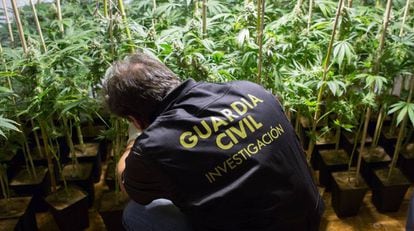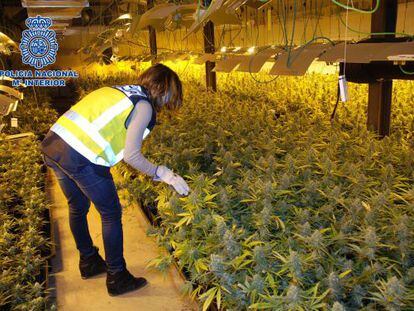Andalusia’s burgeoning home-grown marijuana economy
A lack of work is boosting production, with a ton of the drug seized in the southern region in 2015


Two plainclothes Civil Guard officers armed with a search warrant knock on the door of a house in Padul, a town of some 8,000 inhabitants in Granada province. Explaining they suspect marijuana is being grown on the premises, they enter and their suspicions are soon confirmed: in one bedroom alone there are 75 plants, each a meter high.
This is no one-off event: throughout the southern region of Andalusia, dozens of such raids are carried out every month. After searching the property, one officer peers out of the top floor window, telling his companion there might be more marijuana in a neighboring house. “The number of raids is pretty high,” says the chief of the local branch of the judicial police. “It’s always been this way in Granada.”
In 2015, the authorities confiscated 1,126kg of marijuana in the province, 438 more than the previous year, according to Spain’s Interior Ministry. Only five other provinces had more than 1,000kg confiscated – Girona, Barcelona, Seville, Valencia and Malaga. But Granada showed the biggest leap in production, with the second-largest volume of marijuana confiscated proportional to the population. Meanwhile, in the whole of Spain, 17,894kg were seized last year, 2,813kg more than in 2014.
There are gangs who pay people to look after plantations in their own homes or in the homes of others
“Nowadays, anyone can turn their home into a plantation,” says Andalusia’s chief of police. “It’s relatively simple. You can get everything you need legally.”
In the case of the grower in Padul, a man in his late 30s who prefers to remain anonymous, he used nine panels, a ventilator, an air-conditioning unit with a special filter to deal with the pungent smell of ripe marijuana plants, extractor fans and a thermostat to regulate the temperature. His plot was restricted to a room three meters long and two meters wide on the third floor of his house but the smell was so still so strong it could be detected outside . “Every expert has his way of doing things, mine is to keep them at 24°C,” he explains.
Police sources suggest that the high incidence of marijuana cultivation in Granada reflects high levels of unemployment. Local judge Emilio Calatayud, who writes a a daily blog called Ideal, agrees.
“In Granada, there are hundreds of jobless people who make money from marijuana. This is not good for society,” he wrote in May. “The cultivation and consumption of marijuana is becoming normalized and we will pay for it because it is not innocuous and nor is the money derived from it.”
The grower in Padul, an unemployed construction worker, fits this description. “After two years of earning nothing, I had to make a living from the first thing that came my way, which was this,” he explains.
When asked if he was ever scared about breaking the law, he says he was at first, but says he had no choice. After acquaintances helped him get started, he was soon producing large amounts of weed.
Granada’s unemployment level is 32.14%, one of the highest rates Spain, trumped only by neighboring Cádiz and Jaén. The chief of police points out that not all unemployed people turn to cultivating marijuana.
Demand for Granada’s marijuana is increasing, with growers exporting not only to the rest of the country but also to Europe. “The foreign media has been here investigating why there is so much production,” say police sources. “We are not only the plantation in Spain, we’re also the plantation in Europe.”
In their weekly raids, police find homes where people are producing between 100 and 5,000 plants. During the first eight months of this year, they have carried out 110 raids and confiscated 53,500 plants, not counting those seized in the provincial capital of Granada itself.

One of the biggest busts was in early July in the remote Lújar mountain range. A shepherd was arrested for allegedly farming 5,160 plants, the biggest haul in the region in recent years.
A kilogram of dried marijuana is worth €1,000 on the black market, say police sources, adding that interior home grows are more profitable as they don’t depend on the weather and so can produce up to four harvests a year. There are gangs who pay people to look after plantations in their own homes or in the homes of others. The Padul grower says he made around €2,000 every two months. “I wasn’t about to get rich, far from it,” he says.
As cultivation needs a vast amount of electricity, home grows often hook up to the grid illegally for their supply. A spokesperson for the Endesa electricity utility in Granada says that one of their employees, his identity hidden by a ski mask, accompanies the police during raids in an effort to put a stop to the practice.
English version by Heather Galloway.












































